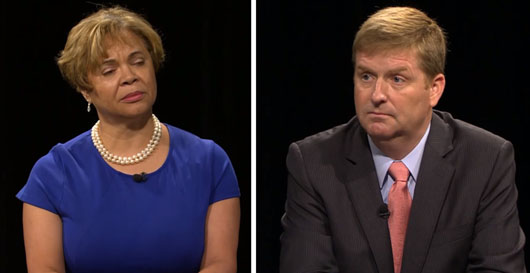by WorldTribune Staff, November 5, 2017
Charlotte and Raleigh will hold mayoral elections on Nov. 7 with gay and transgender rights taking center stage after passage of the House Bill 2 compromise replacement law.
Charlotte will choose a new mayor to replace Jennifer Roberts, who lost the Democratic primary last month amid a fight over LGBT rights. Two city council members, Democrat Vi Lyles and Republican Kenny Smith, are running to replace Roberts.

In Raleigh, Democratic candidate Charles Francis is challenging unaffiliated incumbent Nancy McFarlane. In the days after he lost an endorsement from a key interest group questioning his credentials on gay rights, Francis issued a statement saying he supports the gay and transgender community, The Associated Press reported.
House Bill 2 was a prominent topic when the two Charlotte candidates debated in the campaign’s final days.
HB2, passed by state legislators in response to action by the Charlotte City Council and approved last year, required transgender people to use restrooms in many public buildings corresponding to the sex on their birth certificates. It also prevented local governments from expanding nondiscrimination ordinances.
A compromise replacement law approved last spring still prevents cities and counties from passing expanded LGBT protections for public accommodations and private employment until December 2020.
In the debate, Smith was asked if he would seek a change to the replacement legislation if online retailing giant Amazon wants Charlotte as its second headquarters.
“I don’t see a scenario where that plays out,” Smith said. “I will work with our partners in Raleigh to make sure that we stand up for Charlotte and that we have the things that are best needed for the city of Charlotte.”
Lyles said she would seek the change immediately.
“If it were a deal-breaker, I would be at the General Assembly, and I would be talking about the types of jobs, what difference it would make for our economic opportunity so that we could get that 5 percent of people . . . out of poverty,” Lyles said. “We’ve got to do something.”
Lyles defeated Roberts by 3,400 votes in the primary.
Jay Leach, pastor of Unitarian Universalist Church of Charlotte, was a Roberts ally and a strong supporter of the city’s passage of an ordinance prohibiting discrimination against the LGBT community. But Leach said he and others were devastated last December when the council rescinded the ordinance in an effort to get House Bill 2 repealed.
“Some of us had really stuck our necks out to defend this mayor and council in their refusal to compromise,” he said. “And suddenly we realized all that was on the table.”
Democrats outnumber Republicans in Charlotte by more than 2 to 1, although unaffiliated voters comprise 30 percent of the electorate.
In the Raleigh, three-term incumbent McFarlane led in the October balloting but fell short of topping the 50 percent threshold needed to avoid a runoff.
McFarlane has been a favorite among liberals, but the Wake County Democratic Party endorsed Francis.
HB2 also became an issue when the political arm of gay rights group Equality North Carolina announced it would only endorse McFarlane in the runoff when both candidates received its backing in the October election. The head of Equality NC alleged information had surfaced that Francis was too close with local Republicans who supported HB2 or previously opposed gay rights, the AP report said.
The LGBT Center of Raleigh named McFarlane its LGBTQ ally of the year for 2017, noting that “we’ve always known that she has our back for important issues that affect our community.”
Meanwhile, Francis issued a statement, reported by The News & Observer, that he opposed HB2 and that Raleigh “needs more city services targeted to the needs of trans people, LGBTQ youth, and the homeless.”
Mayoral incumbents in Asheville, Fayetteville, Greensboro and Wilmington also are seeking re-election on Nov. 7, while Durham voters will pick a new mayor.
In Durham, Mayor Bill Bell decided not to seek re-election after 16 years in office. Current city council member Steve Schewel and former council member Farad Ali advanced from the primary. Schewel was the top vote-getter in October. Ali received Bell’s endorsement the week after the primary.
Subscribe to Geostrategy-Direct __________ Support Free Press Foundation
